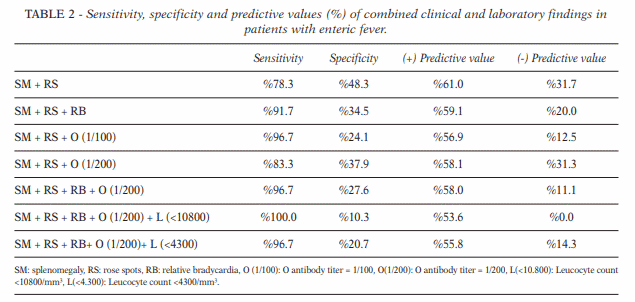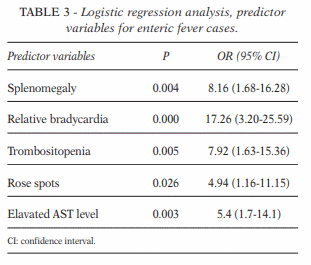In the Absence of Microbiological Confirmation, these case defintions and criteria may be helpful.
Case definitions of Typhoid Fever
a. Confirmed enteric fever:
- A patient with persistent fever (38 °C or more) lasting 3 or more days, with laboratory-confirmed S. typhi organisms (blood, bone marrow, bowel fluid)
- A clinical compatible case that is laboratory confirmed
b. Probable enteric fever:
- A patient with persistent fever (38 °C or more) lasting 3 or more days, with a positive sero-diagnosis or antigen detection test but no S. typhi isolation
- A clinical compatible case that is epidemiologically linked to a confirmed case in an outbreak
c. Chronic carrier: An individual excreting S. typhi in the stool or urine for longer than one year after the onset of acute typhoid fever. 1
Combined Clinical and Lab Findings in Enteric Fever

Independent predictors

In this study, splenomegaly, rose spots, relative bradycardia and thrombocytopenia and elevated AST level were found to have a predictive value for enteric fever. Therefore, the diagnosis of enteric fever can be made prior to microbiological test results when these findings are present in the first 24 hours of hospitalization. In addition, splenomegaly, rose spots, relative bradycardia, a titer of O antibody 1/200, normal leukocyte count (<10800/mm3) or leucopenia (<4300/mm3) in patient with fever have a high sensitivity in the diagnosis of enteric fever. 2
Clinical criteria studied by Neopane et.al.
Requirement: 3 Major Criteria + 3 or more Minor Criteria
The study revealed that the sensitivity of criterion though only 72.2%, the specificity is 98.3% (CI: 89.8-99.9) which is very high. The results showed positive likelihood ratio of > 10 and negative likelihood ratio less than 0.4. 3
Major Criteria:
- Fever
- Headache
- Relative bradycardia
Minor Criteria:
- Pain abdomen
- Splenomegaly
- Diarrhea
- Chills
- Vomiting

He is the section editor of Orthopedics in Epomedicine. He searches for and share simpler ways to make complicated medical topics simple. He also loves writing poetry, listening and playing music.